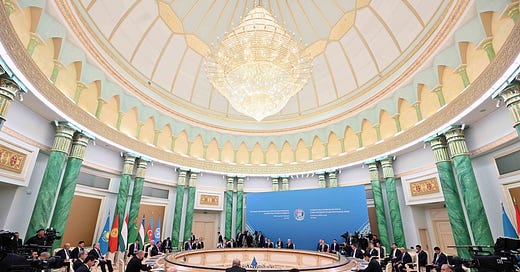Central Asia's week that was #18
Regional leaders meet, Olympic joy and disappointment, and a Kazakh ex-minister punished. Also, stolen assets recovered, fewer Tajiks going to Russia, and officials to design women's clothes.
So this happened…
The presidents of Kazakhstan, Kyrgyzstan, Tajikistan, Turkmenistan, and Uzbekistan met in Astana for the sixth Consultative Meeting of Central Asian Heads of State. Azerbaijan’s President Ilham Aliyev was also in attendance. Speaking at the opening of …
Keep reading with a 7-day free trial
Subscribe to Havli - A Central Asia Substack to keep reading this post and get 7 days of free access to the full post archives.





